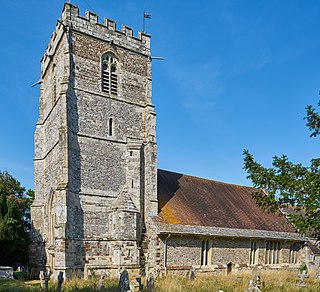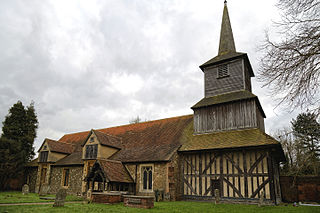
Newtownards is a town in County Down, Northern Ireland. It lies at the most northern tip of Strangford Lough, 10 miles (16 km) east of Belfast, on the Ards Peninsula. It is in the civil parish of Newtownards and the historic baronies of Ards Lower and Castlereagh Lower. Newtownards is in the Ards and North Down Borough. The population was 29,677 in the 2021 Census.

Gisborough Priory is a ruined Augustinian priory in Guisborough in the current borough of Redcar and Cleveland, North Yorkshire, England. It was founded in 1119 as the Priory of St Mary by the Norman feudal magnate Robert de Brus, also an ancestor of the Scottish king, Robert the Bruce. It became one of the richest monastic foundations in England with grants from the crown and bequests from de Brus, other nobles and gentry and local people of more modest means. Much of the Romanesque Norman priory was destroyed in a fire in 1289. It was rebuilt in the Gothic style on a grander scale over the following century. Its remains are regarded as among the finest surviving examples of early Gothic architecture in England.

Thorpe Thewles is a village which had history dating back to the 12th century. The village shares a parish with Grindon and is in the Borough of Stockton-on-Tees, County Durham, Northern England. It lies near the A177 road between Stockton-on-Tees and Sedgefield.

The Abbey of St Mary is Grade I listed ruined abbey in St Dogmaels in Pembrokeshire, Wales, on the banks of the River Teifi and close to Cardigan and Poppit Sands.

Cogges is an area beside the River Windrush in Witney, in the West Oxfordshire district, in Oxfordshire, England, 0.5 miles (800 m) east of the town centre. It had been a separate village and until 1932 it was a separate civil parish.

Rosserk Friary is a friary located in County Mayo, Ireland and a National Monument. Located along the river Moy, the friary was set up by the third order of Franciscans.

Malton Priory, Old Malton, North Yorkshire, England, is near to the town of Malton. It was founded as a monastery of the Gilbertine Order by Eustace fitz John, the lord of Malton Castle. Fitz John founded both Malton Priory and Watton Priory around 1150; some sources suggest that this was an act of penance for his support for the Scots in the Battle of the Standard.

The A20 is a road in County Down in Northern Ireland. It runs from Belfast to Newtownards and on to Portaferry.

Lancaster Priory, formally the Priory Church of St Mary, is the Church of England parish church of the city of Lancaster, Lancashire, England. It is located near Lancaster Castle and since 1953 has been designated a Grade I listed building. It is in the deanery of Lancaster, the archdeaconry of Lancaster and the Diocese of Blackburn. Its benefice is combined with that of St John and St Anne.

St Nicolas' Church, Kings Norton, is the Anglican parish church of Kings Norton, in the Diocese of Birmingham, West Midlands, England.

St Bees Priory is the parish church of St Bees, Cumbria, in England. There is evidence for a pre-Norman religious site, on which a Benedictine priory was founded by the first Norman Lord of Egremont William Meschin. It was dedicated by Archbishop Thurstan of York, sometime between 1120 and 1135.

The Black Abbey of Kilkenny,, Ireland, is a Catholic priory of the Dominican Order, dedicated to the Holy and Undivided Trinity. Black Abbey was established in 1225 as one of the first houses of the Dominican Order in Ireland.

Cranborne Priory is a former priory church in the village of Cranborne, Dorset, England. Founded in 980 as Cranborne Abbey, it became a priory in 1102, remaining that way until it was dissolved in 1540. The tower, nave and aisles from the priory survive to form the Church of St Mary and St Bartholomew, the parish church of Cranborne. The building, which has fragments from the 12th century, is designated a Grade I listed building.

The Church of St Mary and St Nicolas is an active Church of England parish church in Spalding, Lincolnshire, England. It was built c. 1284 on the site of an earlier church, and is a Grade I listed building.

St Christopher's Church is in Marine Road East, Bare, Morecambe, Lancashire, England. It is an active Anglican parish church in the deanery of Lancaster and Morecambe, the archdeaconry of Lancaster, and the diocese of Blackburn. The church was built in 1933 to a design by Henry Paley of the Lancaster practice of Austin and Paley at a cost of £5,957. Its architectural style is Free Perpendicular. The architectural historian Nikolaus Pevsner commented that it is "pleasant to look at, but very conservative for its age". Its plan consists of a nave, north aisle, chancel, and northeast tower. A planned south aisle was never built. Most of the windows are in the style of the 16th century; those in the aisle are transomed. The stained glass includes the east window and the window at the east end of the chapel by Shrigley and Hunt dating from the 1930s. There is more 20th-century glass elsewhere in the church made by Abbott and Company of Lancaster. The two-manual pipe organ is the result of a rebuild in 1984 of an older organ by George Sixsmith.

St Botolph's Church is an Anglican church in Quarrington in Lincolnshire, England.

Market House is a municipal building in Conway Square, Newtownards, County Down, Northern Ireland. It is a Grade B+ listed building.

The Church of St Mary the Virgin in Pilton is the 13th-century Anglican parish church for the Pilton suburb of Barnstaple in Devon. It has been a Grade I listed building since 1951 and comes under the Diocese of Exeter.

St Laurence's Church is an Anglican church, in the village of Blackmore, Essex, England. It is a former priory church, and is noted for its wooden bell tower. It is a Grade I listed building.

St Saviour's Priory is a ruined Augustinian monastery in Glendalough, County Wicklow, Ireland.




















